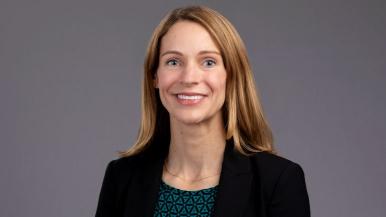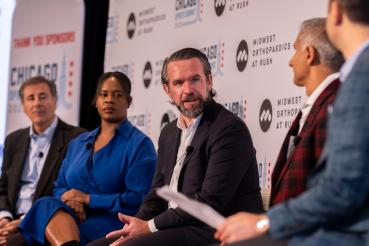Anne Hoffmann, PhD, a speech-language pathologist (SLP) and researcher at Rush University, takes some uncommonly creative approaches to reaching low-income children who need support with learning and communication.
“A lot of the families we see in clinic don't have access to the practices we recommend,” she says. “That started me thinking about how we could increase access to good practices we have strong evidence for.”
Hoffmann, associate professor of communication disorders and sciences in Rush University’s College of Health Sciences, specializes in neurodevelopmental disabilities as both a researcher and clinician. She recently won two coveted Rush research awards that will allow her to put a couple of her intriguing ideas to work in Rush's primary service area on the West Side of Chicago.
Hoffmann was one of three inaugural Health Equity Research Scholars chosen by the Rush BMO Institute for Health Equity. Her award will help underwrite a project to coach West Side childcare providers on how to use the best therapeutic practices for children who have language delays.
Hoffmann also co-leads one of five teams that received a President's Collaborative Research Award, established by then-Rush University President Sherine Gabriel, MD, for a multidisciplinary project to provide resources such as books, games and other literacy aids to young children and their families who are experiencing homelessness.
“The overarching theme of her work is bringing awareness and resources to children in historically marginalized communities,” says Lisa LaGorio, PhD, a speech language pathologist and assistant professor of Communication Disorders and Sciences at Rush.
Hoffmann says it has been “a pretty natural progression, seeing how well families and children respond to intervention,” and then to come to the point where she is hitting the road to bring effective early intervention to some of the people who need it most. The sooner children are diagnosed, the better they are likely to do, she says.
Going where the children are
“We shouldn't be finding children who are 4 or 5 years old with significant developmental delays who have never had someone tell them how to access services, but we find that pretty frequently,” Hoffmann says. “The more tools we can give those community members, the less likely it is to have children who are missed for so long.”
Telehealth, which came into its own in the early days of the COVID-19 lockdown, has been a valuable tool for delivering treatment to people at home, but the pandemic has intensified the stresses on families with limited financial means.
“When you're working in pediatrics, you're working with families,” Hoffmann says.
The mean household income of the families she serves is less than $20,000. Hoffmann's team found that while many children were in child care, some parents were struggling to find suitable options for children with developmental delays. Hoffmann thought, “Why not go where the children are?”
Partnering with an organization that supports childcare providers on the West Side, Hoffmann's team started with a small pilot project. The Health Equity Research Scholars award will allow them to expand that, providing 30% salary time for 18 months, mentorship support and $10,000 to cover other expenses. Children will receive three months of treatment through the program and then transition to a provider in the community, or to school if they are old enough. Experienced caregivers, like those taking part in this project, are often able to identify children who have a communication delay, and research has shown that children benefit from having caregivers who are engaged in their therapy.
he value of the practices her team uses with these children is well established, Hoffmann says. “The goal is progress, changing the trajectory, meeting them where they are and helping them communicate better,” she says. But this new approach offers other benefits, too. The research project focuses on training caregivers, and they will come out of the experience with a sought-after skillset that could improve their own work prospects. In fact, including caregivers as “equal partners in the research” has been important for Hoffmann. And Rush SLP graduate students will be part of the team of trainers, enhancing their mastery as well.
Literacy support for homeless children
The literacy project works with children, mostly preschoolers, in shelters for people experiencing homelessness. Hoffmann is co-principal investigator with Laura Pabalan, MD, assistant professor of pediatrics at Rush. The other investigators are Karen Lui, MD, assistant professor of pediatrics; and Lauren Little, PhD, associate professor of occupational therapy and associate dean of research for the College of Health Sciences.
“Early literacy and early language go hand-in-hand,” LaGorio says.
A librarian is helping the team choose culturally sensitive books, and they’re partnering with pediatricians who are established in the community and trusted in the shelters. Trust is an important aspect of community work, Hoffmann notes. “They have to know you and what you're trying to do,” she says. “It’s important to convey that the community stands to gain something, too.”
Both projects may address disparities in other disadvantaged communities. “If we can show evidence that this approach is effective and people in the community appreciate it, we can start recommending it to other medical centers or graduate school programs,” Hoffmann says. “Dispersion of good practices is the next step.”
She has worked on several studies with Rush colleague Elizabeth Berry-Kravis, MD, PhD, a professor, pediatric neurologist and researcher in Fragile X syndrome and Niemann-Pick disease (genetic conditions that affect brain development and language acquisition). Hoffmann credits this collaboration with pushing her to become comfortable with rigorous scientific research. In addition, Berry-Kravis is “a patient-centered physician, always going above and beyond,” Hoffmann says.
“That was a really good model for me to have,” she says, “that every research project must eventually benefit patients.”
‘A fantastic collaborator’
For her part, Berry-Kravis says of Hoffmann, “She has been willing to take on some of these projects that no one has done before, where there's not a template. She’s open to new measures and methodology.”
Little agrees that Hoffmann is a “fantastic collaborator.” Over time, Little says she believes “her work can make a significant contribution to impacting disparities in development.”
Hoffmann grew up in Indianapolis. Her father is a surgical pathologist and her mother was a biology professor. She started out with a straightforward interest in language, leaning into French after discovering crêpes at a food fair in middle school. She spent a semester abroad in Toulouse, France, and enjoyed “digging into a different culture.” Her original career path was headed toward linguistics in a leisurely fashion from her concentration in French (a bachelor's degree from Washington University in St. Louis and a master's degree from the University of Texas at Austin).
Along the way, she decided, “I wanted to do something that would have an impact,” she says. She obtained a master's degree in speech-language pathology and a PhD in speech and hearing science from Ohio State University in Columbus and served as a postdoc in pediatrics at Rush with Berry-Kravis. She began working at Rush in 2012.
With her recent community-based projects, “I think we are equipping community members to better support those who have needs,” she says. “The more people who know these practices, the better off everyone will be.”



